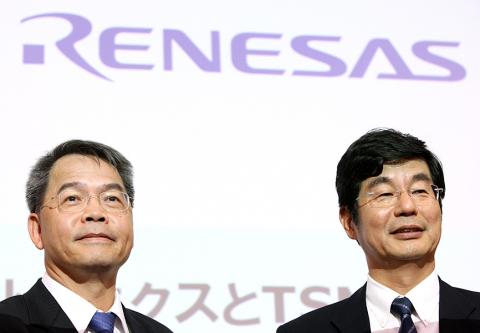Taiwan Semiconductor Manufacturing Co (TSMC, 台積電), the world’s biggest contract chipmaker, announced yesterday that it would expand collaboration with Japan’s loss-making Renesas Electronics Corp, in a bid to boost both companies’ microchip manufacturing technology and business.
TSMC and Renesas, the world’s biggest supplier of microcontroller chips for automobiles, yesterday signed an agreement to manufacture MCUs for Renesas, using 40 nanometer embedded flash (eFlash) process technology, according to a joint press release.
Renesas previously agreed that it would outsource MCUs to TSMC using 90 nanometer eFlash process technology.

Photo: Bloomberg
Under the agreement, TSMC will advance Renesas’ MONOS (Metal-Oxide-Nitride-Oxide-Silicon) technology to 40 nanometer process to make MCUs that are used in next-generation automotive and consumer applications such as home appliances, a public relations official at TSMC said by telephone.
However, he declined to comment on whether Renesas would outsource more MCUs to TSMC.
“Renesas is one of the leaders in the MCU market and the collaboration will help deliver the performance Renesas needs for new production introduction with the level of quality and reliability its customers have come to expect,” Jason Chen (陳俊聖), TSMC’s senior vice president of worldwide sales and marketing, said in the press release.
Renesas had been under constant pressure to invest heavily in waging a technological war against emerging overseas rivals to produce smaller and more powerful chips at lower prices, according to recent media reports. The company lost ¥62.6 billion (US$785 million) in the year to March.
At 40 nanometer process, MCU products could achieve higher speed, lower power consumption and more than 50 percent smaller die size compared with the current 90 nanometer node, according to the news release. Furthermore, by making the MONOS process platform available to other semiconductor suppliers around the world (including fabless companies and IDMs), Renesas and TSMC aim to set up an ecosystem and further widen the customer base, the two companies said.
Renesas senior vice president Shinichi Iwamoto said the move to its rival would see more efficient and flexible production, making it easier to match fast-changing customer demand. However, he did not comment on reports the company would cut about 14,000 jobs, or 30 percent, of its workforce as part of a major restructuring.
“We acknowledge the need for job cuts, though nothing has been decided,” he told reporters in Tokyo yesterday.
He also declined to comment on an earlier story in the Nikkei Shimbun that said it planned to raise ¥100 billion, mainly from its top shareholders, NEC Corp, Hitachi Ltd and Mitsubishi Electric Corp.
Renesas may sell some of its 19 production plants in Japan, including one in Tsuruoka, Yamagata Prefecture, the Yomiuri Shimbun reported on Sunday after saying last week the company plans an alliance with TSMC.
Lin Cheng-ming (林振銘), a director in charge of specialty technology at TSMC, who also met reporters yesterday in Tokyo, declined to comment whether the company is considering a plant from Renesas.
Japan’s microchip industry has struggled amid a strong yen and fierce competition, especially from South Korean and Taiwanese rivals, while manufacturers were also hit by last year’s quake and tsunami disaster.
In Tokyo trading, shares of Renesas tumbled 10.62 percent yesterday to ¥244 after hitting an all-time low of ¥238 earlier in the day.
Shares of TSMC closed 2 percent higher at NT$81.6 in Taipei.

Sweeping policy changes under US Secretary of Health and Human Services Robert F. Kennedy Jr are having a chilling effect on vaccine makers as anti-vaccine rhetoric has turned into concrete changes in inoculation schedules and recommendations, investors and executives said. The administration of US President Donald Trump has in the past year upended vaccine recommendations, with the country last month ending its longstanding guidance that all children receive inoculations against flu, hepatitis A and other diseases. The unprecedented changes have led to diminished vaccine usage, hurt the investment case for some biotechs, and created a drag that would likely dent revenues and

Global semiconductor stocks advanced yesterday, as comments by Nvidia Corp chief executive officer Jensen Huang (黃仁勳) at Davos, Switzerland, helped reinforce investor enthusiasm for artificial intelligence (AI). Samsung Electronics Co gained as much as 5 percent to an all-time high, helping drive South Korea’s benchmark KOSPI above 5,000 for the first time. That came after the Philadelphia Semiconductor Index rose more than 3 percent to a fresh record on Wednesday, with a boost from Nvidia. The gains came amid broad risk-on trade after US President Donald Trump withdrew his threat of tariffs on some European nations over backing for Greenland. Huang further

CULPRITS: Factors that affected the slip included falling global crude oil prices, wait-and-see consumer attitudes due to US tariffs and a different Lunar New Year holiday schedule Taiwan’s retail sales ended a nine-year growth streak last year, slipping 0.2 percent from a year earlier as uncertainty over US tariff policies affected demand for durable goods, data released on Friday by the Ministry of Economic Affairs showed. Last year’s retail sales totaled NT$4.84 trillion (US$153.27 billion), down about NT$9.5 billion, or 0.2 percent, from 2024. Despite the decline, the figure was still the second-highest annual sales total on record. Ministry statistics department deputy head Chen Yu-fang (陳玉芳) said sales of cars, motorcycles and related products, which accounted for 17.4 percent of total retail rales last year, fell NT$68.1 billion, or

MediaTek Inc (聯發科) shares yesterday notched their best two-day rally on record, as investors flock to the Taiwanese chip designer on excitement over its tie-up with Google. The Taipei-listed stock jumped 8.59 percent, capping a two-session surge of 19 percent and closing at a fresh all-time high of NT$1,770. That extended a two-month rally on growing awareness of MediaTek’s work on Google’s tensor processing units (TPUs), which are chips used in artificial intelligence (AI) applications. It also highlights how fund managers faced with single-stock limits on their holding of market titan Taiwan Semiconductor Manufacturing Co (TSMC, 台積電) are diversifying into other AI-related firms.